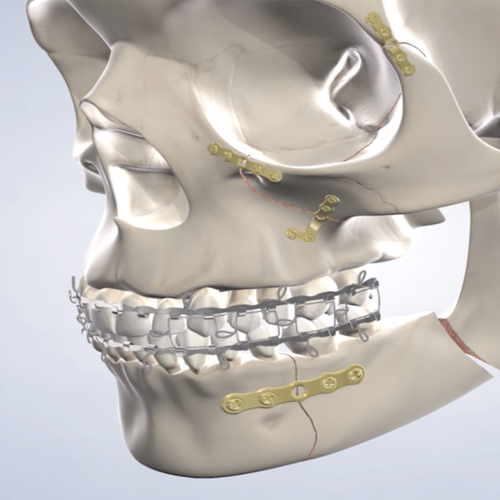

FACIAL TRAUMA
FACIAL TRAUMA TREATMENT BY BEST MAXILLOFACIAL SURGEON
Facial trauma is any injury of the face and upper jaw bone (maxilla).
CAUSES
As per our expert maxillofacial surgeon blunt or penetrating trauma can cause injury to the area of the face that includes the upper jaw, lower jaw, cheek, nose, or forehead. Common causes of injury to the face include:-
- Auto-mobile accidents
- Penetrating injuries
- Violence
SYMPTOMS
- Changes in sensation and feeling over the face
- Deformed or uneven face or facial bones
- Difficulty breathing through the nose due to swelling and bleeding
- Double vision
- Missing teeth
- Swelling around the eyes that may cause vision problems
EXAMS AND TESTS
The maxillofacial surgeon will perform a physical exam, which may show :-
- Bleeding from the nose, eyes, or mouth, or nasal blockage
- Breaks in the skin (lacerations)
- Bruising around the eyes or widening of the distance between the eyes, which may mean injury to the bones between the eye sockets
ACCORDING TO OUR MAXILLOFACIAL SURGEON
The following may suggest bone fractures :-
- Abnormal sensations on the cheek and irregularities that can be felt
- An upper jaw that moves when the head is still
- A CT scan of the head may be done.
BEST TREATMENT BY OUR MAXILLOFACIAL SURGEON
Patients who cannot function normally or who have significant deformity will need surgery. The goal of treatment is to:-
- Control bleeding Create a clear airway Fix broken bone segments with titanium plates and screws Leave the fewest scars possible Rule out other injuries Treat the fracture.
- Treatment should be immediate, as long as the person is stable and there are no neck fractures or life-threatening injuries.
OUTLOOK (PROGNOSIS)
The following may suggest bone fractures :-
- Patients generally do very well with proper treatment. You will probably look different than you did before your injury.
- You may need to have more surgery 6 - 12 months later.
POSSIBLE COMPLICATIONS
General complications include, but are not limited to:-
- Bleeding
- Uneven face
- Infection
- Brain and nervous system problems
- Numbness or weakness
- Loss of vision or double vision

Q.HOW SHOULD I TREAT INFECTED GUMS?
The treatment of gums requires removal of the plaque or tartar which remains so closely attached to the gums. Antibiotics may be required for the treatment of minor gum infections. If the infection advances to a periodontal disease, then the treatment can necessitate root planning and curettage